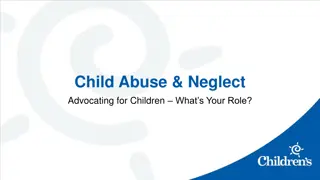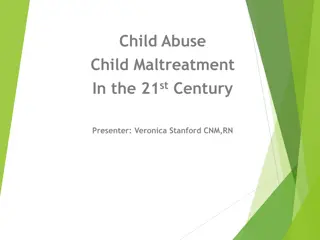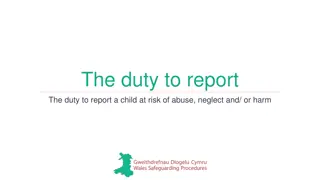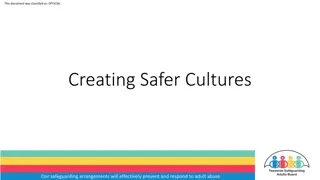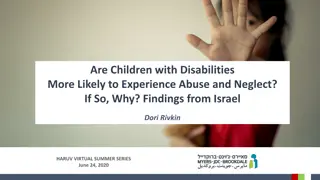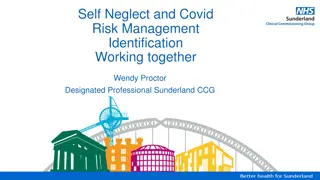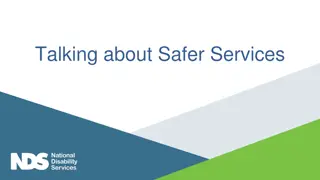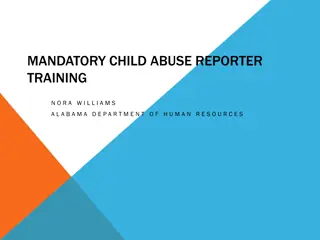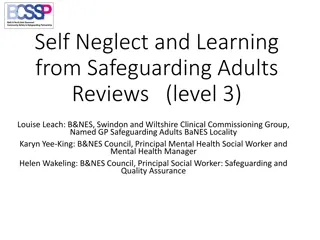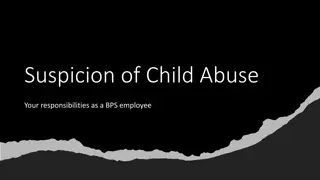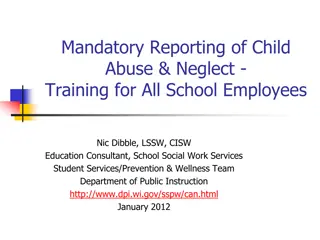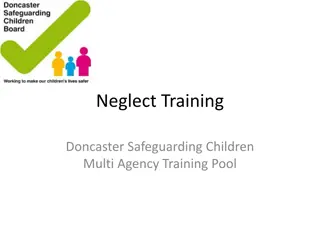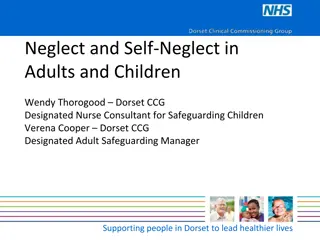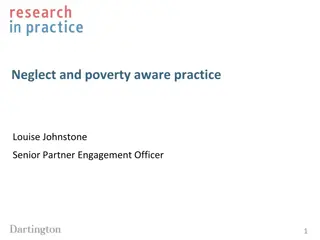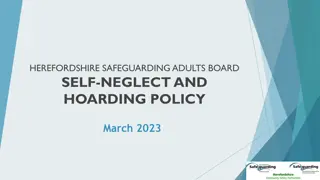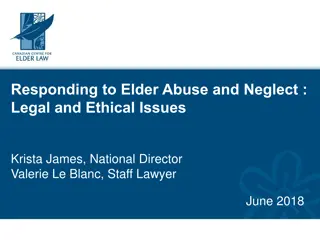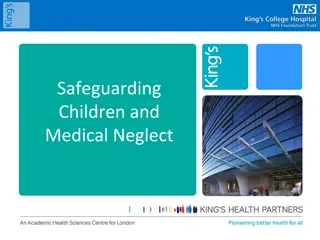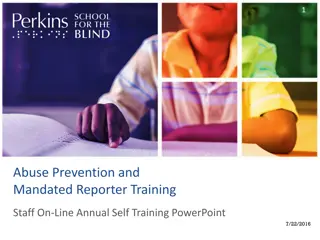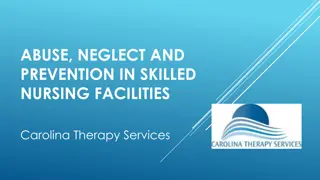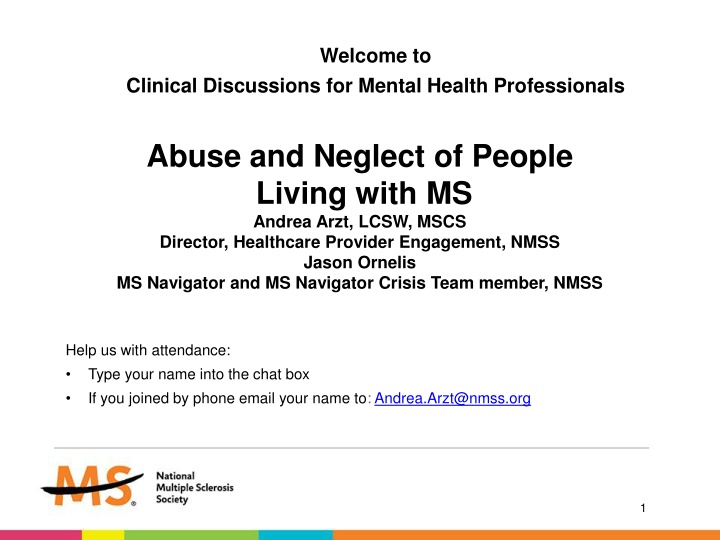
Managing Abuse and Neglect Cases in Multiple Sclerosis Community
Learn about the prevalence of abuse and neglect among individuals with advanced multiple sclerosis (MS) and how the crisis team at the National MS Society offers support and interventions. Explore the challenges faced by mental health providers in addressing these issues and the importance of ongoing training and professional development in this area.
Download Presentation

Please find below an Image/Link to download the presentation.
The content on the website is provided AS IS for your information and personal use only. It may not be sold, licensed, or shared on other websites without obtaining consent from the author. If you encounter any issues during the download, it is possible that the publisher has removed the file from their server.
You are allowed to download the files provided on this website for personal or commercial use, subject to the condition that they are used lawfully. All files are the property of their respective owners.
The content on the website is provided AS IS for your information and personal use only. It may not be sold, licensed, or shared on other websites without obtaining consent from the author.
E N D
Presentation Transcript
Welcome to Clinical Discussions for Mental Health Professionals Abuse and Neglect of People Living with MS Andrea Arzt, LCSW, MSCS Director, Healthcare Provider Engagement, NMSS Jason Ornelis MS Navigator and MS Navigator Crisis Team member, NMSS Help us with attendance: Type your name into the chat box If you joined by phone email your name to: Andrea.Arzt@nmss.org 1
Why was this topic chosen? 1. An underdiscussed and under-recognized issue for people living with MS, particularly those living with advanced MS. 2. A particularly challenging issue for mental health providers because multiple people, complicated dynamics and needs involved some not easily addressed or changed. 3. An overall increase in domestic violence related to the pandemic has been reported, due to added stressors and greater isolation at home of people and families already at risk. 2
Article Abstract (edited) Abuse and Neglect of People with MS: A survey with the North American Research Committee on MS (NARCOMS) Elizabeth H. Morrison , Dara Sorkin , Laura Mosqueda ,Napatkamon Ayutyanont, 2020 An estimated 100,000 Americans with advanced multiple sclerosis are at risk of mistreatment, yet we lack national prevalence data on abuse and neglect. Objective was to determine the incidence and prevalence of caregiver abuse and neglect among US adults with advanced MS Through an anonymous telephone survey with NARCOMS, authors administered the STRESS-MS and other study measures to 206 US adults who had unpaid caregivers because of MS related disability RESULTS: 54.9% of respondents disclosed undergoing some form of mistreatment since first requiring caregiving by a family members or friend, including psychological abuse (44.2%), financial abuse (25.2%) physical abuse (11.2%) or sexual abuse (8.3%). Many had experienced multiple forms of mistreatment. Mistreated respondent reported less social support, more alcohol use, and higher levels of fatigue and cognitive impairment. Daily caregiving increased mistreatment risk. Caregivers with mental illness were 13 times more likely to be abusive or neglectful. Poor premorbid relationships with caregivers nearly tripled mistreatment risk, while any significant alcohol use history by people with MS or caregivers doubled risk. 3
MS Navigator Management of Abuse and Neglect Cases The crisis team helps via call observing and through chat Debrief and supports staff Six policy and procedure documents: Suicidal and Homicidal ideation Adult Abuse and Neglect Child Abuse and Neglect Homelessness Domestic Abuse Reporting to Authorities On-going training and professional development 4
Data from National MS Society FY20 Crisis Statistics 467 Interactions Vulnerable Child: Vulnerable Adult: 5% 11% Suicidal Ideation: 16% Domestic: 34% 1% Homicide: 16% Homelessness 17% Non Crisis: 5
Discussion Points 1. How do the statistics and risk factors noted in the NARCOMS survey or from Navigator data compare with the experiences of your practice? 2. How do you evaluate risk in your practice/facility? 3. Once risk has been evaluated as abuse or neglect (or at extreme risk for such), what have been your next steps? 4. What are the largest challenges in handling abuse or neglect with your patients living with MS, or in your work with caregivers? 5. How does tele-mental health change the ability to address abuse and neglect issues? 6. What would be most helpful in your feeling more successful in handling/treating situations of abuse/neglect? Resources? Training? Support? What else? 6
National Resources: National Adult Protective Services Association: http://www.napsa-now.org/get-help/ Child Welfare Information Gateway: https://www.childwelfare.gov/ Ombudsman Resource Center: http://www.napsa-now.org/get-help/help-in-your-area/ National Domestic Violence resources: Hotline-1-800-799-7233 Chat-http://www.thehotline.org/what-is-live-chat/ Text-LOVEIS to 22522 Connect to an MS Navigator: 1-800-344-4867 contactusnmss@nmss.org Social media/web chat 7
Next Steps (Action and/or Learning) Utilize the resources in this presentation and others. Become familiar with the resources in your area If you are using tele-health sessions to treat patients in a location not local to you become familiar with the resources in that area. Utilize MS Navigators 1-800-344-4867, ContactUsNMSS@nmss.org Partner with patient s physician, MS specialists, other social workers and supports working with your patient and family members. If you make a referral to Navigators, Adult Protective Services or other support services, do not refer and see your responsibility as ended. Be a part of the team for information and follow up to allow for optimal success. 8
Thank you for joining us Please complete the post meeting survey: WE NEED YOUR FEEDBACK! https://www.surveymonkey.com/r/PJH82DT The next scheduled Clinical Discussion for Mental Health Professionals Thursday, March 18, 2021 2 pm 3 pm ET To register: https://www.surveymonkey.com/r/MSClinicalDiscussionRegistration 9

